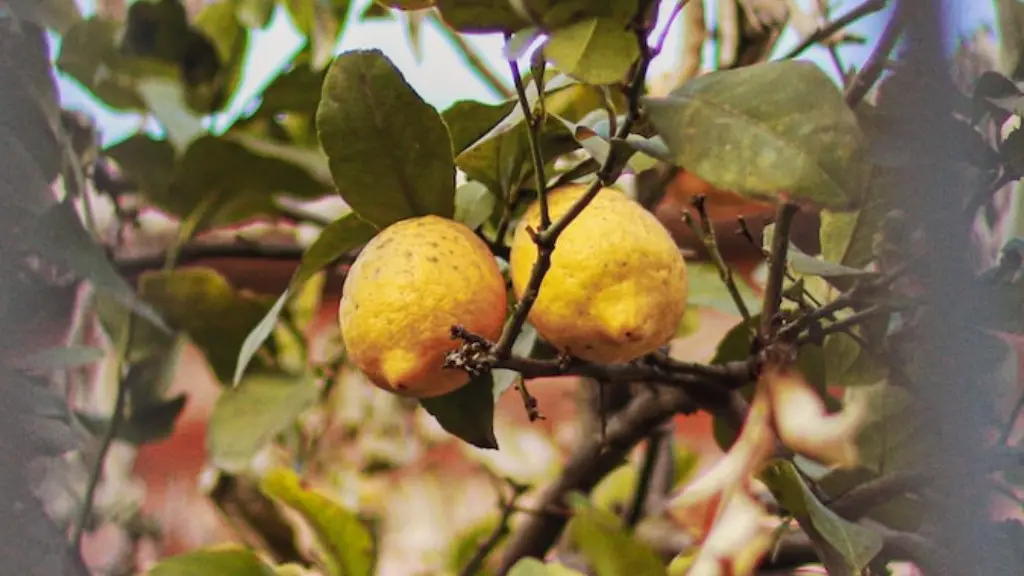The question of why some lemon trees do not flower despite receiving all the necessary care and attention is a perplexing one, with a variety of potential answers. One possibility is that the tree has come to the end of its lifecycle, as many citrus trees go through a natural period of dormancy and fading away after a period of years. Another reason may be incorrect pruning, as over-pruning of the branches can inhibit flowering. In addition, lemon trees may be slow to flower if they are a hybrid species propagated from cuttings, as they require more time to mature and reach the age where they are capable of producing buds. Furthermore, lemon trees may not flower if they are not receiving proper nutritional requirements, as an increase in soil nutrients and additional fertilizer can help a mature-aged tree bloom.
Watering Requirements
Insufficient watering is another potential reason why a lemon tree will not flower. It is critical to keep a lemon tree sufficiently hydrated during its blooming period, as insufficient moisture can lead to fewer flowers, or none at all. Adequate watering should typically be carried out around once a week, depending on the soil conditions and temperature. Moreover, attention should be paid to the volume of water given, as too much water can be just as detrimental as too little due to the lemon tree’s highly sensitive root system. To ensure the soil is being properly drained after being watered, it is recommended to perform a soil test to check the moisture levels.
Temperature
Temperature can have an impact on lemon trees too, particularly if the temperature drops excessively or rises too high. When temperatures remain too low, the tree will naturally delay the flowering process; similarly when temperatures stay too high, the tree may begin its flowering process earlier than expected, causing it to become dormant much faster. Keeping the lemon tree in a temperate and consistent environment is therefore essential if one is looking to promote flower growth.
Other Considerations
Bugs, pests and disease can also cause citrus trees not to flower, as they can injure branches, prevent leaf growth and even compromise the tree’s water intake. Treatment options, such as insecticide, can help to mitigate further damage and reduce the risk of disease, although it is important to employ the assistance of a horticultural expert to recommend the most effective course of action. Additionally, it is possible for a lemon tree to be overly fertilized, which can cause it to become nutrient-stressed and prevent any buds from forming.
Light Requirements
Without adequate light, a lemon tree will not flower due to its need to produce energy from sunlight. If a tree is planted in an area with inconsistent or weak sunlight, it is recommended to move the tree to a brighter, more direct-light area or provide an artificial light and shade solution. However, caution should be taken when moving the tree, as too much light or moving it too quickly can cause the tree to become sunburned, which can easily lead to fungus and disease.
Potential Worst Case Scenarios
In some cases, it is possible that a lemon tree’s lack of flowering can be linked to its age, as it may be too old to produce buds. Alternatively, it may also be the case that the tree is not old enough to bloom yet, as some lemon trees do not flower until they have reached 4-5 years of age. In these cases, the tree should eventually flower when it is of the appropriate age.
Managing pests
Inspecting for pests and controlling bug infestations is also important when attempting to get a lemon tree to flower. Commonly found pests in lemon trees include whiteflies, beetles, mites, caterpillars and aphids. These organisms feed off the sap of the lemon tree and can stunt the growth of new buds. As such, it is important to inspect the branches and leaves of a lemon tree for potential pest infestations, and if there is an invasion, to take appropriate measures to control them in a safe, effective and environmentally-friendly manner.
Testing Restrictions
To confirm the causes of a lemon tree’s flower deficiency, a few tests may be needed. Among these tests are pH and nutrient level checks, as well as other analyses that identify the soil composition and evaluate the tree’s overall health. By assessing these factors, gardeners can better understand what modifications may be needed to increase bloom chance, as well as how to manipulate the environment to produce the most optimum conditions.
Improving Photosynthesis
When trying to increase flower production in a lemon tree, it is important to take a holistic approach and consider all of the tree’s environmental needs. One of these needs is sunlight, as a lemon tree relies on photosynthesis to transform the light it receives into energy to power its natural processes, such as growth and flowering. Analysis of the tree’s access to sunlight will be necessary to ensure the tree is receiving an ample supply of light, and to optimize the tree’s position for maximum sun exposure.
Cutting Practices
In certain cases, pruning may also be beneficial for encouraging citrus tree flowering. While pruning should be done with care in order to avoid damage to the tree, it can offer the benefits of helping create a healthier and more structured plant. Additionally, by pruning the tree properly, it is possible to ensure that the buds are receiving the benefits from adequate sunlight. Thus, it is important to seek the advice of an arborist or horticulturist before carrying out citrus tree pruning.
Root Training
Root training is a useful and efficient technique employed by professional growers and enthusiasts alike to help support citrus tree production, as well as citrus tree flowering. Root training involves gently pruning the roots of a lemon tree to control and manipulate its growth, allowing the tree to grow in a manner that promotes an increased chance of flower production. In addition, root training can help to eliminate potential root problems that can stunt blooming.
Fertilizers
Fertilizers are critical for citrus tree production as they provide essential nutrients for the tree to thrive. Depending on the variety of lemon tree in question, different fertilizer types and quantities may be needed for it to properly flower. It should be noted, however, that over-fertilizing a lemon tree can actually inhibit its flowering production, as the extra nutrients and salts can block the water uptake process due to an imbalance in the energy-powering metabolic process known as photosynthesis.



